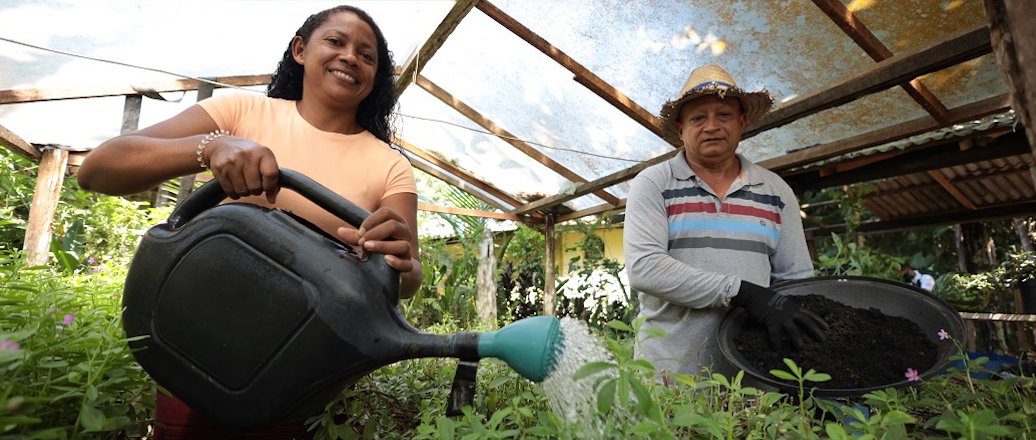With the constant debates on sustainability and preservation, so in vogue today with the term ESG, which brings together environmental, social responsibility and governance policies, and COP27, it is natural that interest in the Amazon increases. And it is from the small farmer, from the communities that experience the Amazon and what it represents that awareness must be promoted.
Aiming to support these communities in the importance of adopting sustainable practices and keeping the forest standing, Hydro and Albras develop several projects in the regions where they operate. One of them, carried out in partnership with the Peabiru Institute, is the Ativa Barcarena Program which, since 2018, has served more than 300 rural producers with the aim of valuing family farming and sustainable food production in the municipality.
“Agroecology is the methodological basis of Ativa Barcarena, which values the knowledge and experience of farmers, providing the development of sustainable agroecosystems. It is also important for biodiversity, as it promotes the conservation of the environment as a whole, food quality, sustainability and social appreciation of the producer”, explains Milene Maués, manager of Socioeconomic Development Projects at Hydro.
Between 2021 and 2022, 24 Demonstration Units for the Preparation of Bioinputs (UD in Portuguese) were installed, which are collectively managed by the producers and are located in seven rural communities in Barcarena. The units are places that bring together the necessary structure for the production of inputs such as biofertilizers, glass water, Bordeaux mixture and other agroecological tools against pests and diseases in plantations.
The Ativa Barcarena team teaches how to structure and maintain demonstration units for the production and application of bioinputs. Schedules, dilution methods, application and care during use were some of the topics presented to participants in the workshops.
The use of agroecological tools helps not only farmers, but also the environment and sustainability. Rosemiro Rodrigues, agronomist for the Ativa Barcarena project, highlights the importance of agroecological practices. “Producers are able to realize that, using agroecology, they avoid degrading the environment and start to think more about sustainability, the health of the soil, plants and the health of the human being who will consume their products. The idea is that we have quality products.”.
In addition, the groups of farmers collect the necessary raw materials for the production of new batches of bioinputs in the community itself, including whey, fresh cattle manure, cane garapa (sugarcane juice) and clean ash, which can come from from the burning of charcoal in flour mills. “All these inputs are mixed inside a 200-liter drum and are in the fermentation process for approximately 30 days, generating 2,000 liters of biofertilizer. Diluted in water, it offers all the nutrients needed by the plant, and most importantly, without harming the environment and at a significantly reduced cost”, explains Rosemiro Rodrigues.
One of the Demonstration Units is managed by the Association of Producers Parque dos Aracuans do Cafezal - APAC, presided over by Raimundo Marques Oliveira Reis, better known as 'Seu Zaca', a family farmer, born in the Cafezal community, in Barcarena. 10 families participate in the management group, which are divided into the actions necessary to maintain the production of agroecological tools. APAC already has a social history in the region, with projects aimed at children, adolescents and women, values gender discussion and today has 70 direct members of the organization, selling various products, including ornamental plants, fruit trees and vegetables.
“All this support has changed our lives, our understanding of the world. For example, today we prioritize the education of our families, my wife is a pedagogue, my daughters have more than one degree, in short, Hydro and Peabiru have been great partners, also working on the importance of agroecology and the notion of preservation, which we had before, helping us to understand that monoculture is not viable, that we need to grow several types of products. We also learned to account for what we produce and generate income from all the production systems we have. Today, I no longer spend on fertilizer. Only the biofertilizer we produce is enough to improve our product and bring a very good yield, as it contributes to a faster ripening of the fruit”, reports ‘seu Zaca’.
Ativa Barcarena Actions
In September 2020, 91 family farmers, residents of 34 communities, including the region of islands, were selected. In 2021, 91 Production Units Development Plans were developed based on the challenges faced by the beneficiary families, 203 technical visits were made to the producing families and 17 workshops were held on the manufacture, dilution and application of bioinputs. In 2022, 343 technical visits were made to project beneficiaries, who were also invited to participate in courses on soil health and workshops to exchange knowledge and learn agricultural methods.
: January 12, 2023







